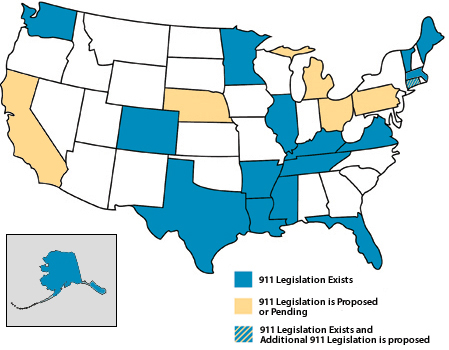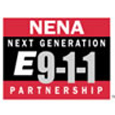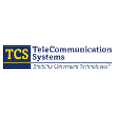E911 State Legislation
Many states are adopting legislation to regulate 9-1-1 service as it applies to Multi Line Telephone Systems (MLTS) or PBXs (Private Branch Exchanges). Some states now require enterprises and/or residential MLTS operators to ensure that when a user calls 9-1-1 on their system, ANI (Automatic Number Identification) and ALI (Automatic Location Identification) are provided to the PSAP (Public Safety Answering Point).
The following are general summaries of applicable state legislation and/or regulations, as well as links to the legislation or regulations themselves. These summaries should not be taken as official records of state law, but are instead for informational use only.

To view the NENA model legislation upon which many states are basing their proposed legislation, click here
| State | Description | |
| Alaska | Municipalities may require MLTS to comply with E911 generally accepted industry standards as defined by the Regulatory Commission of Alaska. |
|
 |
||
| Arkansas | Any person, company, or corporation, public or private, providing exchange telephone service is required to forward the telephone number and street address of any telephone used to place a 9-1-1 call to the PSAP, if the PSAP is E9-1-1 compatible. |
|
 |
||
| California | Proposed legislation would require every telephone exchange service, competitive local exchange carrier, multi-line telephone system (MLTS), PBX, key set system, Centrex, or similar system to provide enhanced 911 (E911) service with automatic routing, ANI, and ALI. |
|
 |
||
| Colorado | MLTS operators who do not provide ANI, ALI, or both must disclose such fact in writing to their end-users and instruct them to provide their telephone number and exact location when calling 9-1-1. |
|
| - Select General Index A to Z | ||
| - Search 29-11-106 | ||
| - Select 29-11-106 to display full text | ||
 |
||
| Connecticut | A private company, corporation, or institution may direct its 9-1-1 calls, along with ANI and ALI, to an on-site security answering point proven to dispatch emergency response services just as well or better than a PSAP. |
|
 |
||
| Florida | All PBX systems installed after January 1, 2004 must be able to provide station level ALI. |
|
 |
||
| Illinois | Residential private switch service providers must ensure that their system provides the 9-1-1 caller’s telephone number and physical location to the PSAP. Also requires private business switch operators to ensure that their system provides ANI and ALI for each 9-1-1 call. Requirements for ERLs (emergency response locations) are outlined. |
|
 |
||
| Kentucky | Residential private switch telephone service providers located in E9-1-1 capable areas must provide number and location information for each 9-1-1 call, and must provide service suppliers with location information specific to the apartment number or floor, if applicable. |
|
 |
||
| Louisiana | All PBX systems installed after January 1, 2005 must be capable of providing station-level ALI. |
|
 |
||
| Maine | For residential MLTS, one distinct ANI and ALI for each location must be provided with 9-1-1 calls. Businesses must provide ANI and ALI for all 9-1-1 calls. Specific requirements for ANI and ALI are outlined. If each end user is not provided one distinctive ANI or one distinctive ALI, or both, the MLTS operator is required to provide written instructions which direct each caller to stay on the telephone and provide the PSAP with his or her telephone number and exact location. |
|
 |
||
| Massachusetts | All new or substantially renovated MLTS must route emergency calls to the appropriate PSAP and provide an ANI and ALI for every 911 call. |
|
 |
||
| Michigan | Proposes that providers of private switch equipment or services for businesses be required to ensure their system provides ANI and ALI for all 9-1-1 calls. Location identification requirements are outlined. |
|
 |
||
| Minnesota | Requires operators of MLTS purchased after December 31, 2004 to ensure that their system provides location information and a callback number for each 9-1-1 call. Residential MTLS should provide one distinctive ANI and one distinctive ALI per residential unit. Location identification requirements for businesses are outlined. |
|
 |
||
| Mississippi | Service providers must provide access to the appropriate PSAP, where available. Anyone operating a shared tenant service is required to provide telephone number location information for each 911 call made from any extension. |
|
| - Select Mississippi Code of 1972 | ||
| - Select TITLE 19 COUNTIES AND COUNTY OFFICERS | ||
| - Select CHAPTER 5 HEALTH, SAFETY AND PUBLIC WELFARE | ||
| - On the right select 19-5-359. Requirement of service suppliers and other parties to provide access to basic or enhanced 911 service; time to comply [Repealed effective July 1, 2010] | ||
 |
||
| Nebraska | Proposes the implementation of state-wide E9-1-1 service by July 1, 2010, but includes no specific requirements for MLTS as of yet. |
|
 |
||
| Ohio | A bill based on the NENA model legislation has been drafted, but is not yet introduced. |
|
 |
||
| Pennsylvania | Proposes that MLTS operators be required to ensure their system provides ALI and ANI for each station. Location information would be required to specify floor, room, building, and/or office or cubicle as applicable. |
|
 |
||
| Tennessee | “Shared Tenant Service Providers” (“any basic local exchange service subscriber who shares or resells basic local exchange service”) must ensure that their system provides ANI and up-to-date ALI for every 9-1-1 call. |
|
 |
||
| Texas | Residential MLTS users must receive the same level of 9-1-1 service as non-MLTS residential users in the region, including but not limited to ANI. |
|
 |
||
| Vermont | Privately owned telephone system operators must provide ANI signaling and station-level ALI data and updates where E9-1-1 is available. |
|
 |
||
| Virginia | All MLTS acquired or installed on or after July 1, 2009 must provide ALI and ANI to the PSAP for each 9-1-1 call unless an alternative method of providing call location information has been approved. |
|
 |
||
| Washington | For businesses with a physical area greater than 25,000 square feet, or occupying more than one floor or building, MLTS providers must ensure that ALI is provided for each telephone. |
|







